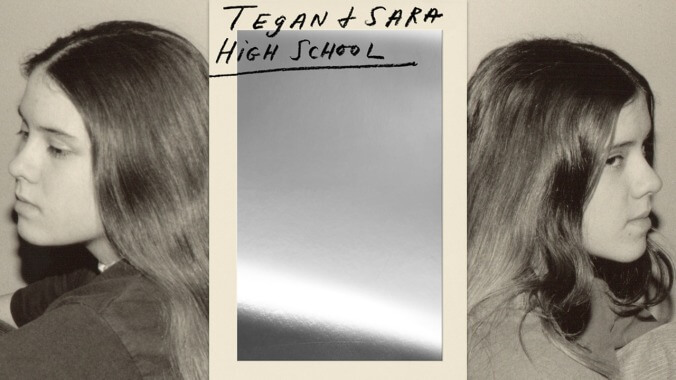At that age, everything feels like an all-or-nothing proposition. To love something so fiercely and passionately that no amount of superlatives can seem like hyperbole is a large part of coming of age; the Quin sisters so unabashedly evoke the spirit of that time in their writing that it’s hard to not be won over by the intensity of their recollections. This is what makes High School work: It’s an autobiographical work that nimbly recreates that bygone era and conveys their feelings and experiences in a universally relatable way. Even as their lives delve into the culturally and personally specific elements of drugs, sexuality, and parental (and sibling) conflict, the honesty in their writing makes it accessible and heartfelt even if your own high school experience was quite different. Much as in their music, the Quins have a way of cutting through platitudes with an incisive combination of bluntness and raw-nerve intimacy.
Of course, sometimes you need to remind yourself who’s doing the talking. The book unfolds in chapters told from the sisters’ alternating points of view: Sometimes Tegan will recount a painful moment, only for Sara to address the fallout. They never double back over the same experience to give different accounts, instead moving forward with their own take on the next noteworthy experience from their day-to-day lives. It’s helpful that the book makes sure to list at the top of the page who’s responsible for the current chapter, because with their largely interchangeable styles of plain, unadorned writing and heart-on-sleeve tone, it can be easy to forget who’s telling what story.
Were it not clearly labeled as memoir, it would be easy to mistake this for a YA coming-of-age novel about twin girls, abetted by the narrative conceit of the rotating point of view. Because there’s an end point in sight from the beginning, in the form of the duo finding success in music right as their high school years come to a close, making for a tidy conclusion to the narrative. The two grew up children of divorce, living with their mother and her boyfriend, who quickly came to be more of a dad than their emotionally distant biological father. As they engage in typical teenage pastimes like blowing off school, drinking and experimenting with drugs, and existing in a constant maelstrom of heightened drama between friends, parents, crushes, and more, the story of their discovering how to play guitar, harmonize their voices, and write songs slowly comes into focus.
Still, the fun of the book comes not from their facility with music and the promise of explosive success on the horizon, but rather the ways in which their all-too-common histories of family drama, romantic woes, and angsty worldview mirror that of so many others. It’s there in Tegan’s description of how two girls shyly meeting one another could quickly form a best friendship over the electrical hum of an old landline (“Bit by bit, I passed pieces of myself to her through the telephone lines connecting us, and she did the same”); it’s present in Sara’s unerring assessment of the emotional high that comes from having your friends acknowledge an achievement you’re proud of (“It felt perfect and embarrassing—the way I sometimes felt on our birthday, or after I’d broken my arm”). And it’s definitely there in both women’s accounts of the endless sniping, screaming through each others’ bedroom doors, and abrupt pivots to intimacy and warmth shared by two siblings who know each other better than anyone else could ever hope. (Though not supernaturally close—Sara mentions that people’s superstitions about “twin-mind-reading nonsense” always bothered her.)
The key subplot running through their stories is both girls’ slow and differently paced struggles with coming out as gay. Anyone who has had experiences with, or knows someone grappling with, the often painful process of figuring out their sexual identity will find instantly relatable scenes here, such as a still-closeted Tegan getting angry with extended family members for their discomfort around homosexuality because it echoed her own internalized sense of homophobia at the time. It even comes to a head with a scene in high school, where Sara confronts a classmate using gay slurs by lashing out in a manner that, were it a scene from a TV drama or movie, would be dismissed as melodramatic, had it not actually happened.
As the pair find girlfriends—and their own senses of confidence—High School wends an empathetic tale of queer identity through its endearing memories of youthful wanderlust and teenage artists finding their musical voice together as sisters. Looked at in excerpts, the prose rarely achieves any kind of notable grace that would make it stand out from the pack of YA dramas about teens, but just as on record, Tegan and Sara use conventional strictures and intensely personal emotion to create something special. Like that Smashing Pumpkins record, their memoir can make even cynical adults feel less alone.

 Keep scrolling for more great stories.
Keep scrolling for more great stories.
